Capsule Hotel Market Research, 2033
The global capsule hotel market size was valued at $216.5 million in 2023 and is projected to reach $460.7 million by 2033, growing at a CAGR of 7.9% from 2024 to 2033. Capsule hotel, which is also known as a pod hotel or sleeping cabin, is a unique and novel type of accommodation available at an affordable price. It is a unique and novel type of accommodation that is budget-friendly and is equipped with basic amenities, which include a single or double bed, pillow, locker facility, alarm clock, charging socket, common washroom, and others.
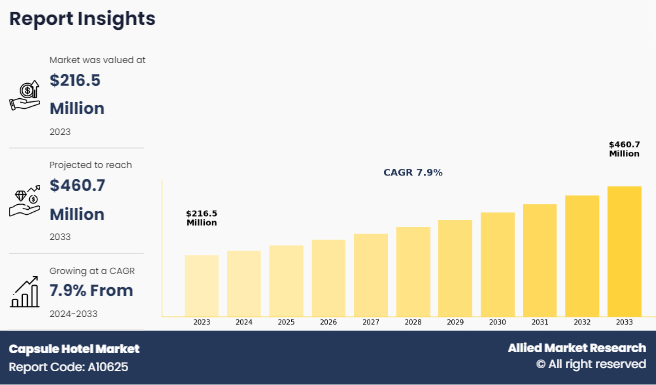
Key Takeaways
- By traveler type, the solo segment dominated the global market in 2023.
- By booking mode, the offline booking segment dominated the global market in 2023.
- By age group, the Generation Y segment dominated the market in terms of revenue in 2023.
- By region, Asia Pacific dominated the market in terms of revenue in 2023. However, Latin America is anticipated to grow at the highest CAGR during the forecast period.
Growth of the travel and tourism industry across the globe along with a preference for cost-effective living during travel drive the demand for capsule hotels among travelers. However, the increase in unrest due to terrorism and domestic issues in countries has created challenges for the growth of the capsule hotel market. Nevertheless, the introduction of capsule hotels in the untapped market is expected to offer opportunities for the growth of the capsule hotel industry in terms of value sales during the forecast period.
Market Dynamics
Over the decades, the tourism industry has experienced significant growth across the globe. This is attributable to the rise in a number of business travelers opting for unique & exotic holiday destinations to get away from the daily hectic schedule and to gain valuable experiences. In addition, there is an increase in travelers who seek simple accommodation for a single night or hourly basis stay. Capsule hotels, located at airports or train stations, offer this kind of facility to travelers at economic rates. These hotels are equipped with all the basic requirements such as USB ports, sockets, storage areas, beds, and others. Thus, the preference for cost-effective and easy-to-stay options proliferates the growth of the travel and tourism industry, which in turn boosts the growth of the capsule hotel market in terms of value sales.
Nowadays, technology has become a basic prerequisite to ensure that multiple operations are carried out immaculately, and the hospitality industry is no different. Technology has always been a supporting factor for the travel and hospitality industry. Technology is disrupting the established market with the advent of web-based booking and the use of AI and IoT in operation optimizations. Technology-driven players such as online booking hotel aggregators and metasearch engines, have heavily invested in big data analytics to make analytics-driven business decisions to offer accommodations such as capsule hotels that are cheap, equipped with basic amenities, facilitate single night and hourly basis stay, and others. This boosts the customer interest toward capsule hotels, while planning their travel, thus contributing toward the growth of the capsule hotel market.
The affordability of capsule hotels plays a crucial role in driving the growth of the market. In an era where travelers are increasingly budget-conscious, these compact accommodations offer an attractive alternative to traditional hotels, which can often be expensive. By providing a basic yet comfortable sleeping space at a fraction of the cost of a standard hotel room, capsule hotels appeal to a wide range of budget travelers, including backpackers, solo adventurers, and budget-conscious business travelers.
Moreover, the cost-effectiveness of capsule hotels extends beyond the price of accommodation itself. These establishments typically require less space and lower overhead costs compared to conventional hotels, allowing them to operate in prime urban locations where real estate prices are high. This strategic positioning enhances accessibility for travelers seeking convenient lodging options, further popelling capsule hotel market statistics and contributing to their continued growth in the hospitality industry.
The increasing trend of solo travel has become a significant driver behind the growth of the capsule hotel market. As more people, particularly millennials and Gen Z, opt to travel alone for leisure or business, there's a growing demand for accommodations that cater specifically to single travelers. Capsule hotels offer an ideal solution by providing compact, individual sleeping pods that offer privacy, security, and comfort at a budget-friendly price point. Solo travelers often prioritize convenience and affordability, making capsule hotels an attractive option for short-term stays in urban areas or during transit.
Moreover, the rise of solo travelers has reshaped the hospitality landscape, with an emphasis on personalized experiences and flexible accommodations. Capsule hotels capitalize on this trend by offering customizable features and innovative designs that appeal to the preferences of solo travelers. Whether it's integrating technology for convenience or providing communal spaces for social interaction, capsule hotels cater to the needs of solo adventurers seeking unique and memorable experiences on their journeys. As a result, the increasing popularity of solo travel continues to drive the expansion of the capsule hotel market worldwide.
Convenience and accessibility are paramount factors driving the rapid expansion of the capsule hotel market. Positioned strategically in bustling urban centers and key transportation hubs such as airports, train stations, and city centers, capsule hotels offer unparalleled convenience for transient travelers. The proximity to transportation hubs makes capsule hotels an ideal choice for individuals seeking short-term accommodation during layovers, overnight stays, or quick business trips. Travelers value the ease of access to these locations, eliminating the need for lengthy commutes or transfers, thereby optimizing time, and enhancing overall travel experience.
Moreover, the accessibility of capsule hotels extends beyond physical proximity, encompassing ease of booking and check-in processes. Many capsule hotels leverage digital platforms and mobile applications, allowing guests to make reservations seamlessly and complete check-in procedures remotely. This streamlined approach to booking and accommodation appeals to modern travelers accustomed to instant gratification and digital convenience. By prioritizing accessibility and offering frictionless experiences, capsule hotels can attract a broader demographic of travelers seeking hassle-free lodging solutions, thereby fueling their continued growth and expansion in the hospitality industry.
Expanding the capsule hotel market into untapped regions presents a multitude of opportunities for growth and innovation. By venturing into less saturated markets, capsule hotels can capitalize on burgeoning travel trends and meet the growing demand for affordable and convenient accommodation options. Emerging travel destinations, both domestically and internationally, offer untapped potential for capsule hotels to establish a presence and cater to a diverse range of travelers seeking unique and budget-friendly lodging experiences.
Moreover, penetrating untapped regions allows capsule hotels to target new customer segments and adapt their offerings to meet local preferences and cultural nuances. This localization strategy can involve tailoring amenities, design elements, and services to resonate with the specific needs and preferences of travelers in each region. By fostering a deeper connection with the local community and leveraging partnerships with regional businesses, capsule hotels can enhance the overall guest experience and differentiate themselves in competitive markets. Ultimately, market expansion into untapped regions not only stimulates growth for the capsule hotel industry but also fosters economic development and tourism opportunities in previously underserved areas.
Segments Overview
The capsule hotel market analysis is segmented into traveler type, booking mode, age group, and region. By traveler type, the market is classified into solo and group. By booking mode, the market is divided into online booking and offline booking. By age group, the market is segregated into Generation X, generation Y, and Generation Z. Region-wise, the market is analyzed across North America (the U.S., Canada, and Mexico), Europe (Germany, France, Italy, Spain, the UK, Russia, and rest of Europe), Asia-Pacific (China, Japan, India, South Korea, Australia, Thailand, Indonesia, and rest of Asia-Pacific), Latin America (Brazil, Argentina, and rest of Latin America), and Middle East and Africa (South Africa, Saudi Arabia, UAE, and rest of MEA).
By Traveler Type
By traveler type, the solo segment held the major share of the capsule hotel market in 2023. Solo travel destinations have been gaining traction owing to the ability to customize the whole travel experience according to their preference, which helps the traveler gather new experiences, meet new people, and attain a sense of empowerment. There has been a significant increase in the number of people who want to travel solo, and this has encouraged travel companies as well as travel agents to provide facilities not only for group travelers but also for solo travelers. According to recent trends, solo tourism is on the rise and the number of people traveling solo by choice has increased. In addition, the unique design and novelty offered by capsule hotels attract large crowds, especially solo travelers which is expected to create more opportunities for key players during the capsule hotel market forecast.
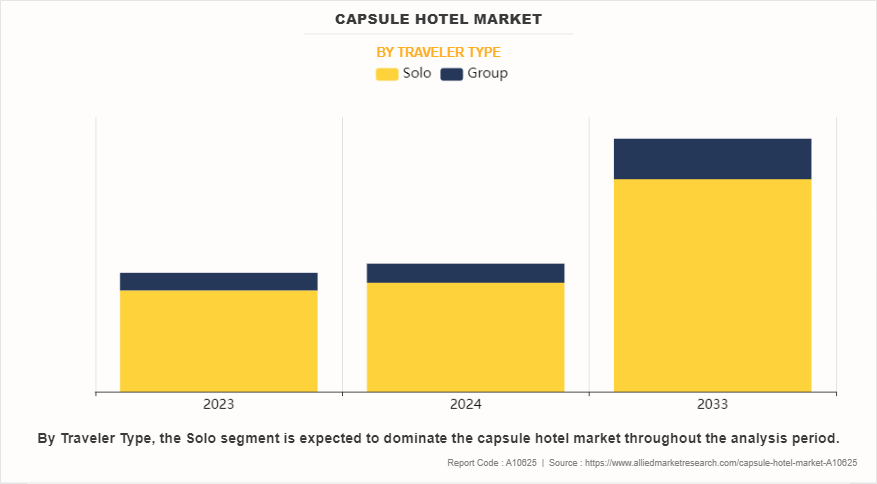
By Booking Mode
By booking mode, the offline booking segment held the major capsule hotel market share in 2023 and is expected to maintain its dominance during the forecast period. Offline booking refers to all the physical centers where booking for a capsule hotel is done. The offline booking segment is expected to witness a slow growth as compared to online booking mode due to the rise in popularity of online booking mode.
By offline, the conventional centers often include travel agents who assist travelers in booking capsule hotels for themselves. Also, the airports in various countries such as Turkey, Japan, Canada, Mexico, the U.S., Singapore, Malaysia, and others, offer the option to reserve capsule hotels or sleeping cabins via offline booking at the terminal or railway station to the travelers inside the airports and train stations on hourly basis to relax before their next flight or train.
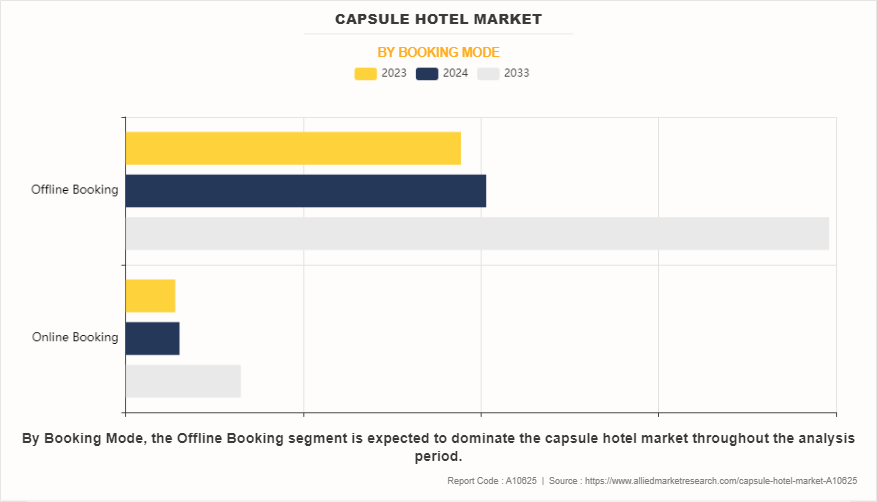
By Age Group
By age group, the Generation Y segment held the major share of the capsule hotel market in 2023 and is expected to maintain its dominance during the forecast period. Travelers between the age group of 21-34 years are millennials or Generation Y travelers. They account for more than 200 million travelers who have been estimated to generate $180 million worldwide, which increased by nearly 30% since 2007. Generation Y are avid travelers comprising a large number of people traveling worldwide.
On average, Generation Y spends $527 a day on a trip, which is 62% less than their older counterparts. They generally look for cultural and leisure breaks. Generation Y is driven by wanderlust and breaking life’s monotony; this group of youngsters prefers short trips to culturally rich countries that offer inexpensive accommodation which is expected to boost the capsule hotel market demand during the forecast period.
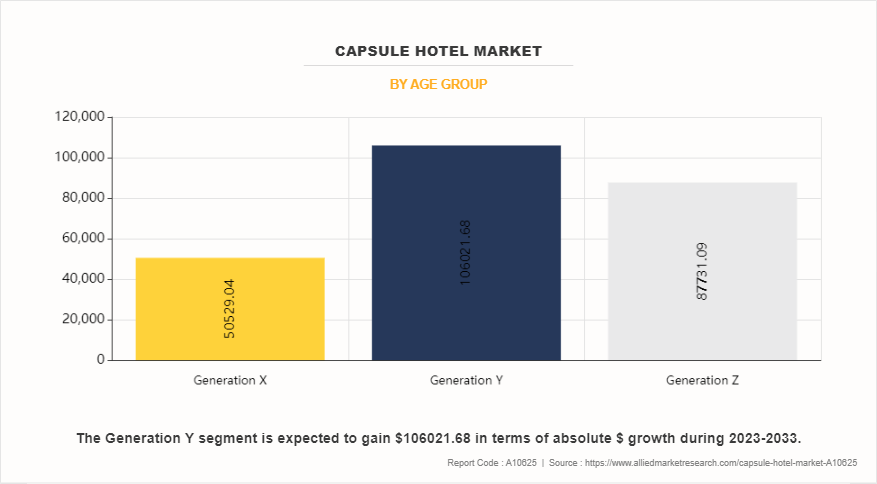
By Region
Region-wise, Asia-Pacific held the major market share of the capsule hotel market in 2023. Asia-Pacific has been known for its diverse culture and attractive destinations. Countries in the Asia-Pacific region have the highest outbound trip concentrations among the higher household income brackets. This can be attributed to the rapidly growing economy and new job opportunities promoting an increase in household income in the Asia-Pacific region which is expected to propel capsule hotel market growth in the upcoming years.
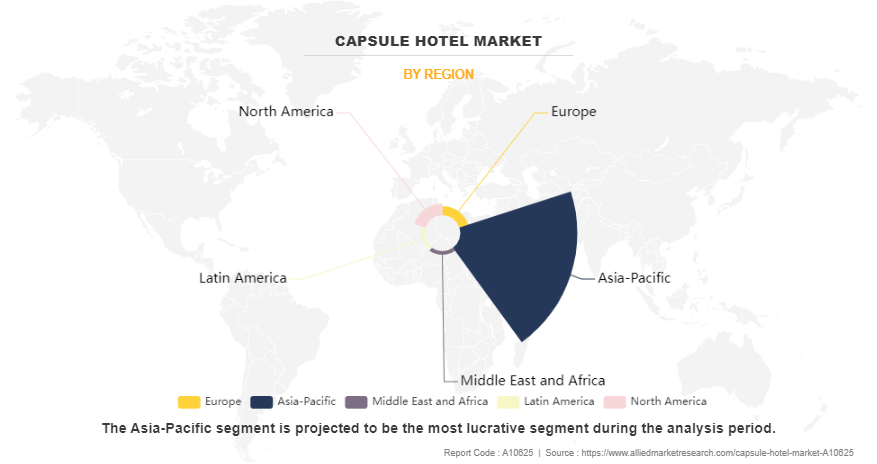
Competitive Analysis
Competitive analysis provides valuable insights into the competitive landscape of a market by evaluating key players, their strengths, weaknesses, strategies, and market positioning. It involves assessing factors such as market share, product offerings, pricing strategies, distribution channels, and customer perception. By analyzing competitors' actions and reactions, businesses identify opportunities, anticipate threats, and make informed decisions to gain a competitive advantage.
This analysis helps in understanding market trends, customer preferences, and industry dynamics, enabling companies to refine their strategies, innovate products, improve customer experiences, and effectively position themselves in the market. Competitive analysis facilitates strategic planning and enhances competitiveness in a dynamic business environment.
Major players such as The Capsule Hotel, First Cabin HD Co., Ltd., and Book & Bed Tokyo have adopted partnership, agreement, and acquisition as key developmental strategies to improve the product portfolio of the capsule hotel market.
Key Benefits For Stakeholders
- This report provides a quantitative analysis of the market segments, current trends, estimations, and dynamics of the capsule hotel market analysis from 2023 to 2033 to identify the prevailing capsule hotel market opportunities.
- The market research is offered along with information related to key drivers, restraints, and opportunities.
- Porter's five forces analysis highlights the potency of buyers and suppliers to enable stakeholders make profit-oriented business decisions and strengthen their supplier-buyer network.
- In-depth analysis of the capsule hotel market segmentation assists to determine the prevailing market opportunities.
- Major countries in each region are mapped according to their revenue contribution to the global market.
- Market player positioning facilitates benchmarking and provides a clear understanding of the present position of the market players.
- The report includes the analysis of the regional as well as global capsule hotel market trends, key players, market segments, application areas, and market growth strategies.
Capsule Hotel Market Report Highlights
| Aspects | Details |
| Forecast period | 2023 - 2033 |
| Report Pages | 310 |
| By Traveler Type |
|
| By Age Group |
|
| By Booking Mode |
|
| By Region |
|
| Key Market Players | The Bed KLCC, 9h Ninehours, Book & Bed Tokyo, Riccarton Capsule Hotel, First Cabin HD Co., Ltd., Hippo Pod, The Bedstee Hotel, Pangea pod hotel, Nadeshiko Hotel Shibuya, CAPSULE HOTEL ‘DARAKHYU’ T1 |
Analyst Review
According to the key market players, the proliferation of the tourism industry has fueled the demand for capsule hotels across the globe. Moreover, the rise in the trend of solo travelers, who love to explore the city as well as experience new types of accommodations has contributed toward the growth of the capsule hotel market.
The key market players operating in the capsule hotels market have adopted key developmental strategies such as providing various facilities at their hotels such as alarm clocks, Wi-Fi connectivity, breakfast facilities, locker facilities, and others to attract travelers. This factor makes way for the development and awareness of the concept of capsule hotels, in turn boosting the growth of the market in terms of value sales.
Furthermore, the key manufacturers added that the availability of capsule hotels at a cheaper rate as compared to other luxury and traditional hotels, lodges, and other accommodation types is another major factor that fosters the growth of the capsule hotel market. Also, these hotels offer the option of hourly basis accommodation and are perfectly located at airports or train stations, which enables the traveler to relax before or after the journey. This in turn boosts the capsule hotel market growth.
The global capsule hotel market was valued at $216.5 million in 2023 and is projected to reach $460.7 million by 2033, registering a CAGR of 7.9% from 2024 to 2033.
The capsule hotel market analysis is segmented into traveler type, booking mode, age group, and region. By traveler type, the market is classified into solo and group. By booking mode, it is divided into online booking and offline booking. By age group, the market is segregated into generation X, generation Y, and generation Z. Region-wise, the market is analyzed across North America (the U.S., Canada, and Mexico), Europe (Germany, France, Italy, Spain, the UK, Russia, and rest of Europe), Asia-Pacific (China, Japan, India, South Korea, Australia, Thailand, Indonesia, and rest of Asia-Pacific), Latin America (Brazil, Argentina, and rest of Latin America), and Middle East and Africa (South Africa, Saudi Arabia, UAE, and rest of MEA).
Asia-Pacific is the largest regional market for capsule hotels
The key players operating in the global capsule hotel market include The Capsule Hotel, First Cabin HD Co., Ltd., UZ.Hotesl, Book & Bed Tokyo, Urbanpod Hotel, The CUBE Hotel Group, Riccarton Capsule Hotel, Nadeshiko Hotel Shibuya, The Bed KLCC, and Pangea pod hotel
The global capsule hotel market report is available on request on the website of Allied Market Research.
Loading Table Of Content...
Loading Research Methodology...



